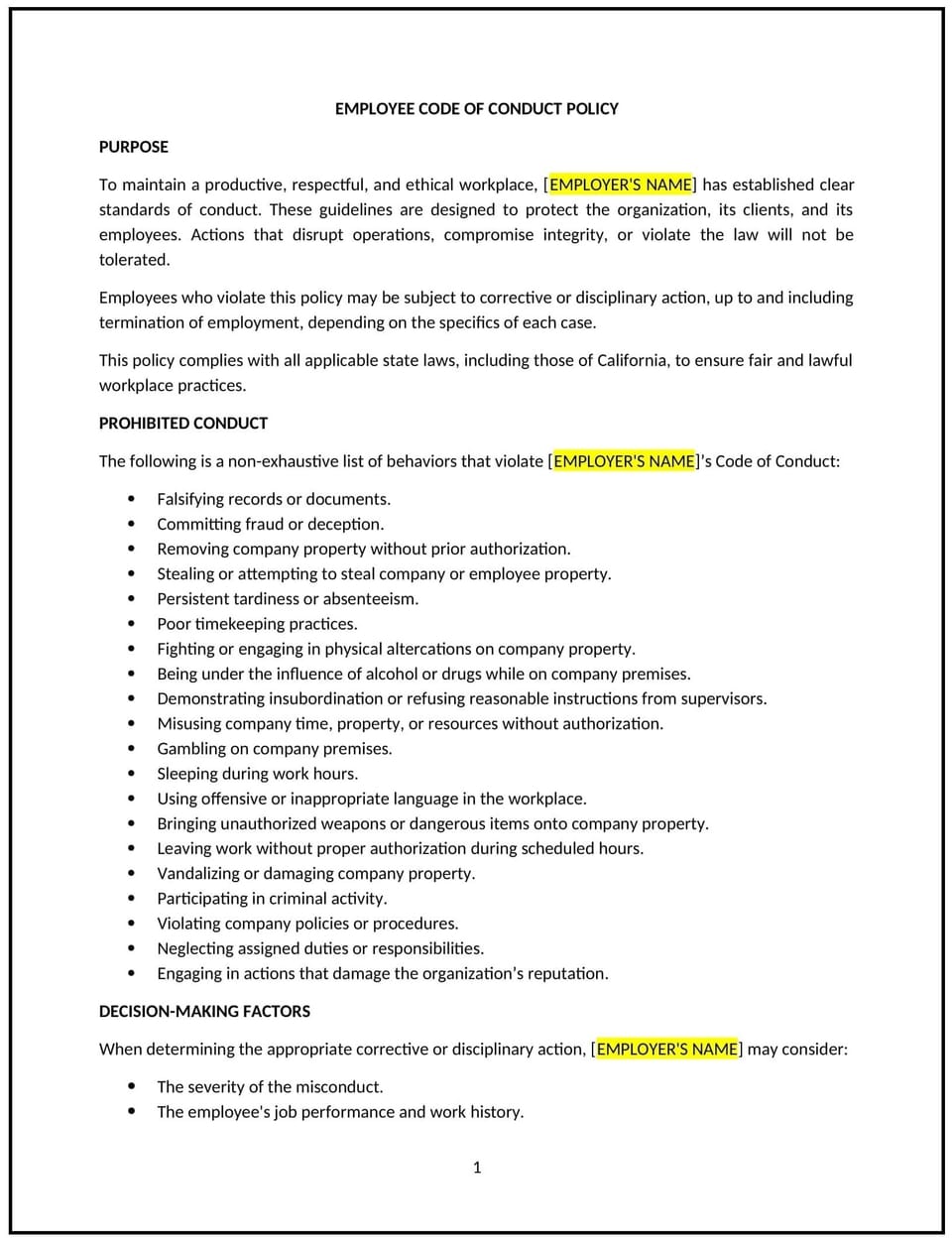Standards of conduct policy (California): Free template

Standards of conduct policy (California)
In California, a standards of conduct policy provides businesses with guidelines to establish clear expectations for employee behavior and performance. This policy supports compliance with California labor laws, such as the Fair Employment and Housing Act (FEHA), and promotes a professional, inclusive, and respectful workplace environment.
This policy outlines acceptable workplace behavior, the consequences of misconduct, and procedures for addressing violations. By implementing this policy, California businesses can foster a positive work culture, minimize conflicts, and reduce legal risks.
How to use this standards of conduct policy (California)
- Define acceptable behavior: Clearly outline expected behaviors, such as respect for colleagues, adherence to company policies, and compliance with applicable laws.
- Address prohibited actions: Specify unacceptable behaviors, such as harassment, discrimination, workplace violence, or theft, in alignment with California labor regulations.
- Communicate expectations: Ensure employees are aware of the standards through onboarding, training, and access to the written policy.
- Establish reporting procedures: Provide clear steps for reporting misconduct, ensuring confidentiality and protection from retaliation.
- Enforce consistently: Apply the policy fairly to all employees and document disciplinary actions for transparency and legal compliance.
Benefits of using this standards of conduct policy (California)
This policy offers several advantages for California businesses:
- Supports compliance: Reflects California labor laws and regulations related to workplace behavior and anti-discrimination.
- Promotes professionalism: Sets clear expectations for employee conduct, fostering a positive and productive work environment.
- Reduces conflicts: Helps prevent misunderstandings and disputes by defining acceptable and unacceptable behavior.
- Minimizes risks: Mitigates legal liabilities by ensuring consistent enforcement of workplace standards.
- Enhances morale: Creates a respectful and inclusive workplace culture that supports employee satisfaction.
Tips for using this standards of conduct policy (California)
- Reflect California-specific laws: Ensure the policy aligns with state regulations, such as FEHA, protecting against workplace discrimination and harassment.
- Train employees: Provide regular training on expected behaviors, anti-discrimination laws, and conflict resolution.
- Encourage reporting: Foster a culture where employees feel safe reporting misconduct without fear of retaliation.
- Document consistently: Maintain records of violations, investigations, and resolutions to ensure accountability and compliance.
- Review regularly: Update the policy to reflect changes in California laws or workplace dynamics.
Q: How does this policy benefit the business?
A: This policy supports compliance with California labor laws, promotes professionalism, and reduces conflicts by setting clear behavioral expectations.
Q: What types of behaviors are prohibited under this policy?
A: Prohibited behaviors include harassment, discrimination, workplace violence, theft, and other actions that violate workplace standards or California laws.
Q: How does this policy support compliance with California laws?
A: The policy reflects state regulations, such as FEHA, ensuring lawful enforcement of workplace standards and anti-discrimination measures.
Q: What steps should employees take if they witness misconduct?
A: Employees should report the incident to HR or their manager following the procedures outlined in the policy, ensuring confidentiality and protection from retaliation.
Q: How can the business enforce this policy consistently?
A: The business can train managers, document all reported incidents, and apply disciplinary actions uniformly to ensure fairness and compliance.
This article contains general legal information and does not contain legal advice. Cobrief is not a law firm or a substitute for an attorney or law firm. The law is complex and changes often. For legal advice, please ask a lawyer.


